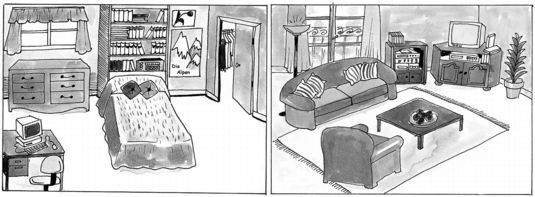| | BEISPIEL: Es gibt einen Computer in dem Schlafzimmer.
|
| 1. | Es gibt _______________ ____________________________ in dem Wohnzimmer. |
| 2. | Ich sehe _______________ ____________________________ in dem Schlafzimmer. |
| 3. | _______________ ____________________________ ist auch im Schlafzimmer. |
| 4. | Anna hat _______________ ____________________________ in ihrem Wohnzimmer; |
| 5. | Es gibt auch _______________ ____________________________ in dem Wohnzimmer. |
| 6. | Man findet _______________ ____________________________ in dem Schlafzimmer. |
| 7. | _______________ ____________________________ steht in dem Wohnzimmer. |
| 8. | Im Wohnzimmer findet man auch _______________ ____________________________. |
| 1. | Hier ist ein Geschenk ___________________________________ (for your brother). |
| 2. | Der Brief ist _______________________________ (from my father). |
| 3. | Er geht _____________________________ (around the table). |
| 4. | Alle waren da ______________________________ (except for her). |
| 5. | Frau Bauer kommt _______________________________ (through the door). |
| 6. | Was hast du ________________________________ (after the class) gemacht? |
| 7. | Sie kommt _____________________________________ (without her books) in die Schule. |
| 8. | Bleibt ihr heute abend _____________________________ (at home)? |
| 9. | Martin hat nichts _______________________________ (against us). |
| 10. | Ihr geht wirklich _____________________________ (without me)? |
| 11. | Ich warte schon ________________________________ (since/for an hour). |
| 12. | Hast du deine Tasche ____________________________ (with you)? |
| 13. | Hilf ___________ (me), bitte! |
| (Szene: | Es ist _________ (a) normaler Tag, die Zeit ist 19 Uhr. __________ ____________ (after their) Arbeit (f.) kommen zwei Menschen in eine Kneipe und setzen sich. Der Mann trinkt __________ (his) Bier und spricht _____ ________ (to the) Frau.)
|
| Dirk: | Guten Abend. ___________ (my) Name ist Dirk Friedrichsen. Wie ist ___________ (your, formal) Name?
|
| Ulla: | Ulla Schäfer. Woher kommen Sie, Dirk?
|
| Dirk: | Ich komme _________ (from) Leipzig, aber ich wohne hier _______ ______________ (with my) Vater. Und Sie?
|
| Ulla: | Ich bin letztes Jahr ________ (from) Bremen hierher umgezogen (=moved).
|
| Dirk: | Ach, wie nett. Wo arbeiten Sie?
|
| Ulla: | ________ ___________ (at the) Universitätsbibliothek (f). Und ___________ (you, formal), was sind Sie von Beruf?
|
| Dirk: | Ich fahre Taxi. Ich muss ___________ (through) und ___________ (around) ganz Berlin fahren. Das Problem ist, ich komme_________ ___________ (after a) langen Tag am Abend ___________ (without) viel Geld aus.
|
| Ulla: | Das tut mir aber leid. Na, kommen Sie, ich kaufe ___________ (you, formal) ein Bier!
|
| Dirk: | Vielen Dank! Mit ___________ (you, formal) kann ich gut sprechen. ___________ ___________ (besides my) Eltern habe ich keine Freunde. Aber meine Mutter ist ___________ ___________ (since one) Jahr im Krankenhaus (=hospital).
|
| Ulla: | Wie furchtbar! Was ist passiert?
|
| Dirk: | Sie ist eines Abends ganz langsam gefahren, als plötzlich (=suddenly) ein anderes Auto __________ ___________ (against her) geknallt ist. Jetzt kann sie gar nicht _________ _____________ (out of her) Bett kommen.
|
| Ulla: | Das ist aber schrecklich! Sie armer Mann, ich kaufe ___________ (you) noch ein (=another) Bier!
|
| Dirk: | Meine Mutter ist auch blind! Im Autounfall (=accident) hat das Glas ________ _________ (from the) Fenster in ihre Augen geschnitten (=cut).
|
| Ulla: | Also. Darf ich ___________ (you, formal) noch ein Bier kaufen?
|
| Dirk: | Bitte. Das ist sehr nett ___________ ___________ (of you, formal).
|
| Ulla: | Wie geht es denn ___________ (your, formal) Vater?
|
| Dirk: | Auch nicht gut. Er ist Invalide. Er hat keine Beine (=legs). Er fiel (=fell) ___________ ___________ (out of a) Zug. Jetzt muss er immer einen Krankenpfleger (=nurse) _______ ___________ (near/with him) haben. Das Leben ist schwierig ___________ ___________ (for him), und auch sehr teuer.
|
| Ulla: | Ach, Sie arme Person! Nehmen Sie ___________ (my) Geld! Ich muss jetzt ________ ___________ (home) gehen. Auf Wiedersehen!
|
| Dirk: | Auf Wiedersehen! Ja, ja. So trinkt man den ganzen Abend Bier, ___________ (without) Geld zu zahlen!
|
